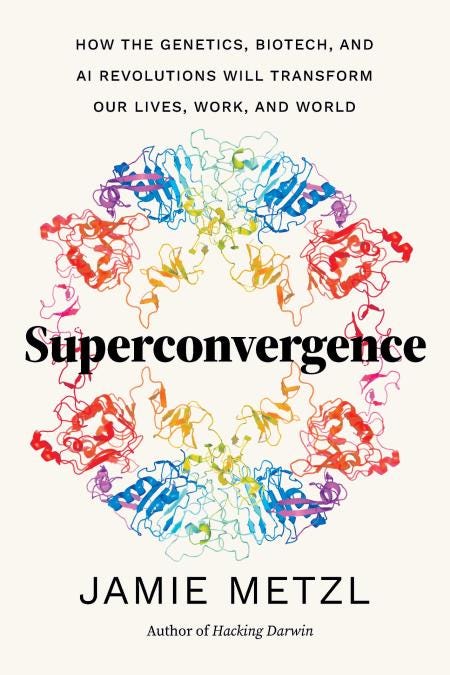Repronews #40: Single women in China still denied access to egg-freezing
Singapore's baby-bust; 5000 genetic variants for cancer risk identified; Jamie Metzl on "Superconvergence" of biotech & AI
Welcome to the latest issue of Repronews! Highlights from this week’s edition:
Repro/genetics
Despite China’s three-child-policy encouraging births, Chinese single women are still denied access to domestic egg-freezing services
Population Policies & Trends
Singapore now has the lowest number of births in over 50 years
Genetic Studies
Researchers have identified over 5000 of the BAP1 gene enabling cancers of the eye, lung lining, brain, skin, and kidney
Further Learning
Jamie Metzl, a former White House official and WHO advisor, has penned a new book entitled Superconvergence on the future of genetics, biotech, and AI
Repro/genetics
“‘Society doesn’t want my kids’: China’s single women forced abroad to freeze their eggs” (Guardian)
Despite China’s push to boost the birthrate, only married couples with fertility problems can use egg-freezing services or any kind of assisted reproductive technologies. Single women are excluded.
“I talked to a doctor, and she told me that to freeze my eggs in China, I either need a husband or I need to have cancer. And I told her, I don’t want either,” said one woman.
More and more educated, urban women are delaying marriage and motherhood. Last year China’s birth rate fell to a record low of 6.39 per 1,000 people and the population shrank by almost 3 million.
Chinese President Xi Jinping has called on society to “actively cultivate a new culture of marriage and childbearing”.
Chinese social media, in particular Xiaohongshu, a female-focused app with more than 200 million users, is awash with young women exchanging tips on where to go to procure the treatment. Some Chinese women secure egg-freezing services abroad in countries such as Czechia and Laos.
“It was very difficult to get practical information,” said one woman, who used a VPN to bypass China’s blocks on accessing the open internet to search on Google and Xiaohongshu. “I have the luxury of being able to financially afford it and also the luxury from my work to be able to travel on holiday, because it’s quite a lengthy period of time,” she added. “So I think I am really lucky, but if you asked me again, I think this has been a really painful process.”
A study published last year by economists Ren Zeping and Liang Jianzhang claimed that more than 65% of 30-to-34-year-olds hoped to preserve their fertility via egg freezing.
The Chinese government has so far not welcomed this trend. In 2020, the national health commission said that allowing single women to freeze their eggs could give women “false hope” and encourage them to delay motherhood, “which is not conducive to protecting the health of women and offspring.”
The topic of relaxing the rules around egg freezing is routinely discussed at China’s political meetings but so far the national policy has remained fixed.
Lijia Zhang, a writer who is working on a book about Chinese women’s changing attitudes towards marriage and motherhood, expects demographic pressures will force China’s policymakers to loosen restrictions. “It is just a matter of time before the authorities will relax the law,” Zhang said. “Without making a song and dance about it, most provinces have allowed single women to register their children and some places even give them maternity benefits.”
In 2022, a Chinese court overruled an attempt by Teresa Xu, a single woman, to sue a Beijing hospital that refused to allow her to freeze her eggs, on the grounds that the hospital was violating her rights. Xu appealed against the ruling last year but is still awaiting a verdict.
More on repro/genetics:
“Having both ovaries removed could come at serious cost to the brain” (Science Alert)
“Prolific Dutch sperm donor responds to Netflix series’ claims” (PET)
“Vertex sues US over fertility support program for Casgevy gene editing therapy” (Reuters)
“‘Dream come true’: study suggests drug could extend women’s fertility by five years” (Guardian)
Population Policies & Trends
“Singapore's Baby Bust: Record low births in 2023 deepen demographic crisis” (population.news)
Singapore is experiencing its lowest number of births in at least 50 years.
33,541 babies were born in 2023, down 5.8% from 2022 and 13.3% from 2021.
Total fertility rate hit a record low of 0.97.
More on population policies and trends:
“How development programs impact fertility rates in Africa” (VoxDev)
“Pro-natal policies work, but they come with a hefty price tag” (Institute for Family Studies)
“More diversity, fewer kids? A new study on diversity and fertility in America” (Institute for Family Studies)
Genetic Studies
“More than 5000 high-risk cancer gene variants identified” (PET)
Researchers from the Institute of Cancer Research, London, collaborating with the Wellcome Sanger Institute, assessed the effects of 18,108 DNA
changes in the BAP1 gene, a well-known tumor suppressor across multiple cancer types. When mutated, BAP1 can cancer growth and development.
The study, published in Nature Genetics, identified over 5000 genetic variants of BAP1 enabling cancers of the eye, lung lining, brain, skin, and kidney.
“Previous approaches for studying how variants affect function in genes have been on a very small scale, or exclude important contexts that may contribute to how they behave,” said Dr. Andrew Waters. “Our approach provides a true picture of gene behaviour, enabling larger and more complex studies of genetic variation. This opens up new possibilities for understanding how these changes drive disease.”
Using UK Biobank data, the researchers confirmed that people carrying harmful BAP1 variants are over 10% more likely to be diagnosed with cancer than the general population.
The researchers have made their results freely available so they can be immediately used straight away by doctors to help diagnose patients and aid treatment choice.
Professor Clare Turnbull said: “This research could mean more accurate interpretation of genetic tests, earlier diagnoses and improved outcomes for patients and their families.”
Because all genetic variants were studied, the researchers hope their findings will help individuals from diverse ethnic backgrounds.
More on genetic studies:
“Study of veterans’ DNA shows diversity sharpened overall results” (STAT)
“Sources of gene expression variation in a globally diverse human cohort” (Nature)
“The general disease (‘d’) factor and mutational load” (Emil Kierkegaard)
Further Learning
“How to prepare for the imminent AI and biotech revolutions, according to a leading futurist” (NBIC)
Jamie Metzl, a former White House official and advisor to the World Health Organization (WHO) on human genome editing, has a written a new book entitled Superconvergence on the future of genetics, biotech, and AI.
Metzl argues these technologies put as on the precipice of fundamental change with the capacity for human-engineered intelligence and human-engineered life. The drivers of this change are compounding, accelerating, and converging. The speed of such change will be historically unprecedented.
Areas that will be transformed include healthcare (with the use of genomics and personalized medicines), agriculture, and advanced materials.
Great harms due to use of biotech are also possible, such as the development of engineered or enhanced pathogens. Metzl believes COVID-19 probably originated due to a research-related accident.
Technologies such as gene drives could eradicate malaria, but could also accidentally crash ecosystems.
Metzl founded the OneShared.World as a global movement recognizing interdependence, namely that problems such as pandemics, climate change, and technology governance are deeply interrelated.
In this new era of uncertainty, Metzl encourages people to learn every day, re-prioritize tasks (especially given that AI will be able to take on many tasks), and think through our values to ensure technologies are used in service of them.
More on human nature, evolution, and biotech:
Evolution
“Fossil of Neanderthal child with Down’s syndrome hints at early humans’ compassion Skull anatomy shows the boy or girl would have been severely disabled, yet survived until the age of six” (Guardian)
“Study brings lifestyle of enigmatic extinct Denisovans into focus” (Japan Times)
“The plague may have wiped out most northern Europeans 5000 years ago” (New Scientist)
Sexual selection: AI resolves 150-year-old controversy between Darwin and Wallace (New Atlas)
Agriculture
“UK becomes first European country to approve lab-grown meat” (Financial Times)
EU approves 2 genetically-modified corn crops for food and feed, but not cultivation (Agriland)
“England’s Precision Breeding Act ‘remains an empty shell and serves no functional purpose’ — Will politics scuttle crop gene editing future?” (GLP)
“Eco-terrorists destroyed an Italian scientist’s gene-edited sustainable rice project. Here is how her team is rebuilding it” (GLP)
“Democrats are more receptive to cultivated meat than Republicans” (Green Queen)
Disclaimer: The Genetic Choice Project cannot fact-check the linked-to stories and studies, nor do the views expressed necessarily reflect our own.


